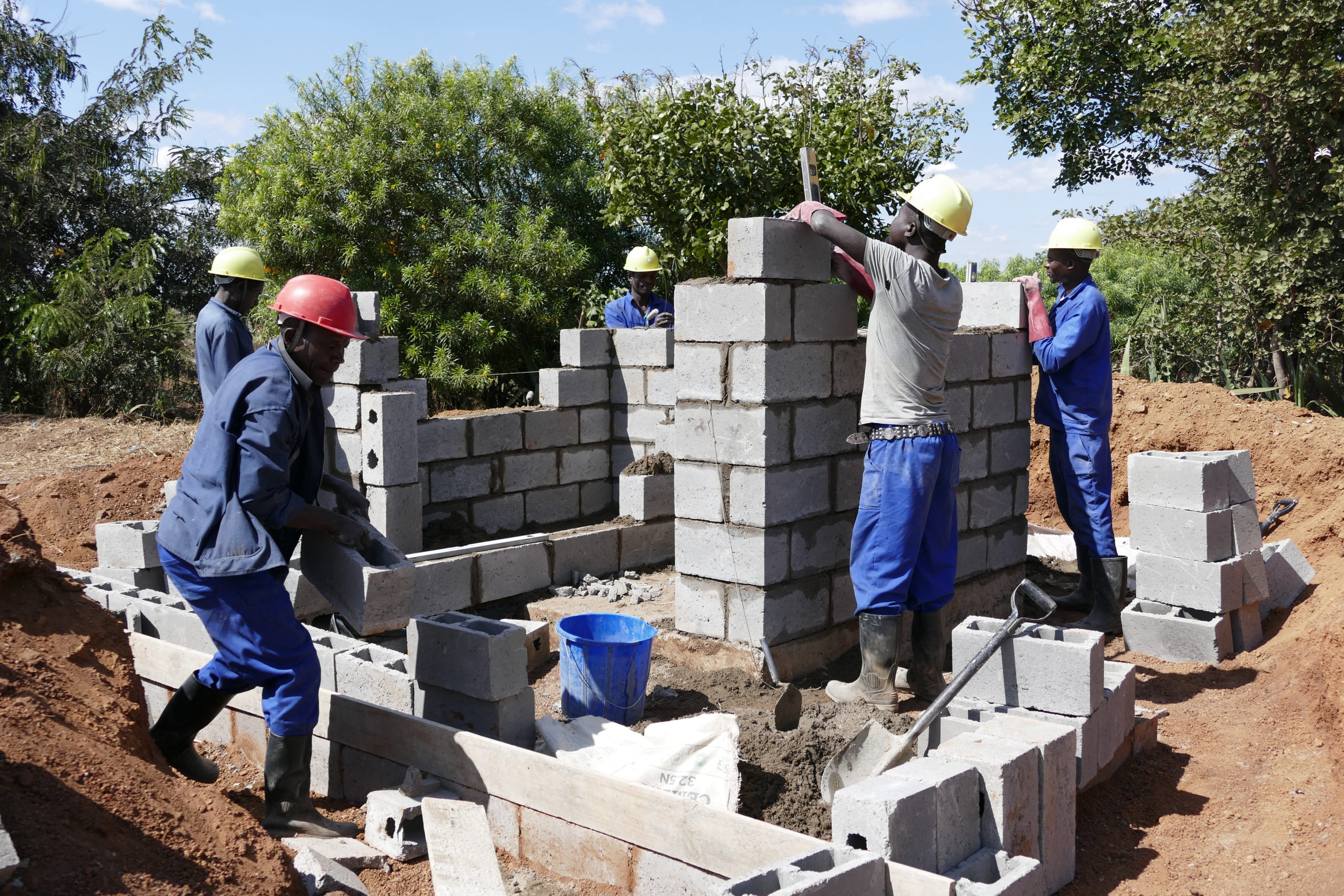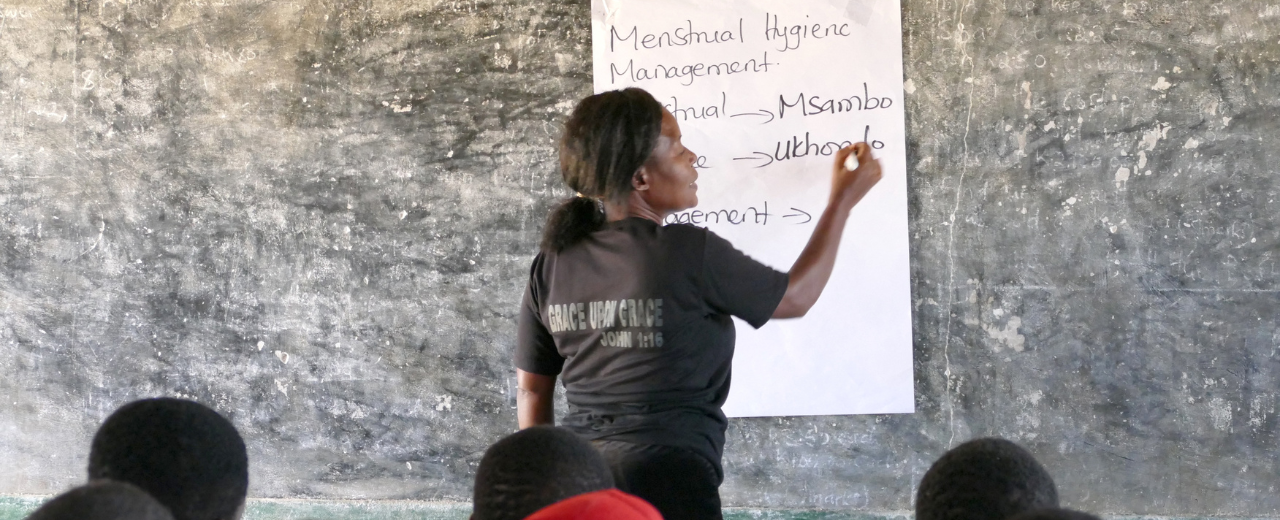 Sturdy toilets and hygiene education
Sturdy toilets and hygiene education
More participation and better health by improved sanitation and hygiene
No real Malawian meal from the school kitchen should be without the traditional Nsima. This national dish is a form of maize porridge. In Malawi, the so-called Nthiko is used for cooking, a wooden spoon that, when cooking for an entire primary school, can be larger than most of the schoolchildren. Nsima is then served together with chicken and various vegetables such as pumpkin leaves. Traditionally, Malawians eat with their hands, shaping small portions of the slightly sticky nsima in the palm of their hands so that they can grab and eat the side dishes - edible cutlery, so to speak! However, in order to avoid an increased health risk for pupils and teachers when eating with their hands, washing hands before every meal is particularly important. And since schoolchildren, like everyone else, have to go to the bathroom, great importance is attached to safe access to clean toilets with hand-washing facilities.
Necessity
Safe sanitary facilities and education on hygiene for primary school children in Malawi
Activity
Local construction companies build new and sturdy sanitary facilities for primary schools. Together with local NGOs, workshops are held for the pupils
Countable effort
Number of safe toilet visits for primary school children. Increased basic knowledge and awareness of hygiene
Result
It is expected that the measure will reduce class absences of primary school children due to waiting times or illness; girls are more confident about their menstrual hygiene
Systemic effect
Improved sanitation and hygiene situation as well as the application of knowledge and behavioural change among primary school children in Malawi
Background
In rural areas of Malawi, the sanitation infrastructure at schools is usually poorly developed or not developed at all (Enzler/Gass, 2018). In addition, the division of a year into the dry and rainy seasons is a challenge for the sanitation and hygiene situation. Inadequate sanitation facilities are often destroyed during the rainy season when the foundations are washed out (Government of Malawi, 2019). There is thus a severely inadequate number of toilets per pupil (Enzler/Gass, 2018). In addition to the poor quality and number of sanitation facilities, female pupils are unable to attend classes during their period due to a lack of washing facilities (UNICEF, 2013). The sixth sustainable development goal (SDG 6) adopted by the UN as part of the 2030 Agenda strives for access to safe sanitation for all people – including schoolchildren (SDGS, 2022). For girls and young women in particular, lack of access to hygiene and sanitation often makes it difficult or impossible to attend school. This is because most young women cannot afford expensive hygiene products, with almost 75% of the population living on an average of less than 2 US dollars per day (World Bank, 2019). Apart from the use of rag scraps, there are no options for adequate menstrual hygiene, which is why schoolgirls are affected more severely by the poor hygiene situation (UNICEF, 2013). Lack of hand-washing facilities and access to safe sanitation and hygiene also pose a high health risk. If schoolchildren cannot wash their hands, the risk of disease transmission increases. In addition, when there are no septic tanks or public defecation is common due to inadequate sanitation, pools of stagnant water form, spreading diseases more quickly (CDC, 2019).
The good deed
Your donation will fund new, sturdy and accessible sanitation facilities with integrated washrooms for primary schools in Malawi. By equipping the sanitation facilities with hand-washing basins, the transmission of diseases can be controlled. Septic tanks prevent stagnant water and also reduce the risk of disease transmission. In addition, more toilets can reduce waiting times and thus absences from lessons. The integrated washrooms for menstrual hygiene allow female pupils to attend classes during their periods. The stable construction of the new sanitary facilities ensures their durability, as they are better protected against damage during heavy rainfall. Workshops will also be held to teach about personal hygiene, hand washing, menstrual hygiene and disease transmission. This will contribute to greater hygiene and sanitation safety in all areas.

About Malawi
Lilongwe
Capital
19,647,681
Number of inhabitants
642.7
Gross domestic product per capita per year
Rang 169 von 191
Human Development Index
Malawi is also called "the warm heart of Africa". Along with a few other countries, it is considered an island of peace in sub-Saharan Africa, which despite poverty is not affected by organised crime and wars (GIGA, 2014).
About the organization and further information
Association
Ingenieure ohne Grenzen e.V.
Website
https://www.ingenieure-ohne-grenzen.org

Further information and source
- Adams J. et al., 2009. Water, Sanitation and Hygiene Standards for Schools in Low-cost Settings, World Health Organization, Switzerland
- Centers for Disease Control and Prevention, National Center for Environmental Health, 2019. Flood Waters or Standing Waters, CDC, USA
- Deutsche Gesellschaft für Internationale Zusammenarbeit (GIZ) GmbH, 2021. Malawi, GIZ, Bonn
- Krause C., 2019. GIZ in Malawi, Deutsche Gesellschaft für Internationale Zusammenarbeit (GIZ) GmbH, Malawi




